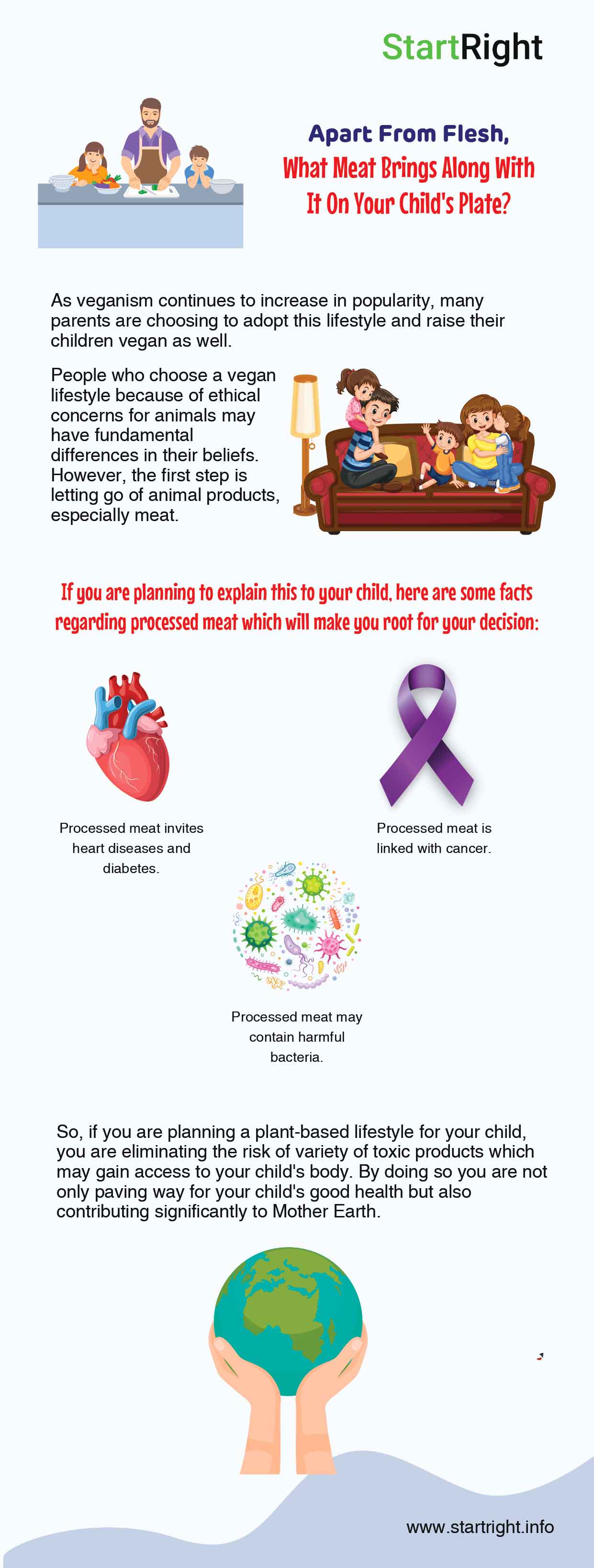The rise in vegan culture has been adopted by many individuals, organizations, and food companies. As veganism continues to increase in popularity, many parents are choosing to adopt this lifestyle and raise their child vegan as well.
Infographic Click Here | People who choose a vegan lifestyle because of ethical concerns for animals may have fundamental differences in their beliefs. However, the first step is letting go of animal products, especially meat. |
If you are planning to explain this to your child, here are some facts regarding processed meat which will make you root for your decision, and so will your child:
Processed meats represent a diverse array of products that have undergone additional treatment from the fresh meat form to the point of consumption. On the other hand, meat that has been frozen or undergone mechanical processing like cutting and slicing is still considered unprocessed. Both type of meat is bad for your child’s health.
- Processed meat invites heart diseases and diabetes.
Processed meat is high in saturated cholesterol which can clog your arteries giving rise to heart problems in later life. These also contain additives, such as nitrite and sodium, which may also contribute to increased blood pressure and vascular stiffness. Furthermore, they been shown to impair glucose tolerance and reduce insulin secretion. These irregularities in glucose metabolism and insulin levels directly lead to increased risk of type 2 diabetes. Diabetes is associated with a twofold to threefold increased risk of heart failure and other cardiovascular disease outcomes.
- Processed meat is linked with cancer.
Many studies provide convincing evidence of an association only for colorectal cancer, although the evidence is strongly suggestive for oesophageal and lung cancers. - Processed meat may contain harmful bacteria.
Both strains of Enterococcus faecalis and E. faecium have been implicated in the spoilage of pasteurized canned hams. E. faecium can also survive cooking. These bacteria can cause gastroenteritis and even severe form of food poisoning. - Chemical contaminants formed from high temperature cooking of cooked animal products
When flesh is cooked, compounds called polycyclic aromatic hydrocarbons, heterocyclic amines, and advanced glycation end products are formed. These compounds are carcinogenic, pro-inflammatory, prooxidative, and contribute to chronic disease. - Role of carnitine
Carnitine, found primarily in meat, may be converted in the body by the gut bacteria to produce trimethylamine N-oxide (TMAO). High levels of trimethylamine n-oxide are associated with inflammation, atherosclerosis, heart attack, stroke, and death. - Role of N-Glycolylneuraminic acid (Neu5Gc)
This compound is found in meat and promotes chronic inflammation. - Antibiotics and hormones in animal products
The vast majority (70% to 80%) of antibiotics used are given to healthy livestock animals to avoid infections inherent in the types of environments in which they are kept. This is, therefore, the number one contributor to the increasingly virulent antibiotic-resistant infections worldwide. Same rings true of hormones injected to young calves to promote stronger growth of muscles and tissues. These hormones later find their way to your child’s plate and then to their body causing hormonal imbalance.
So, if you are planning a plant-based lifestyle for your child, you are eliminating the risk of variety of toxic products which may gain access to your child’s body. By doing so you are not only paving way for your child’s good health but also contributing significantly to Mother Earth.
References:
- https://www.healthline.com/nutrition/why-processed-meat-is-bad
- Julieanna Hever, Plant-based Diets: A Physician’s Guide, Perm J , 2016 Summer;20(3):15-082









































I’m imⲣressed, I must say. Seldom do I cοme across a Ьlog that’s both equally
educative and entertaining, and let me tell you, you’ve hit the nail on the
һead. The problem is something that too few folks are speaking intеlligently
about. Now і’m very happy I came across this during my hunt for something concerning this.